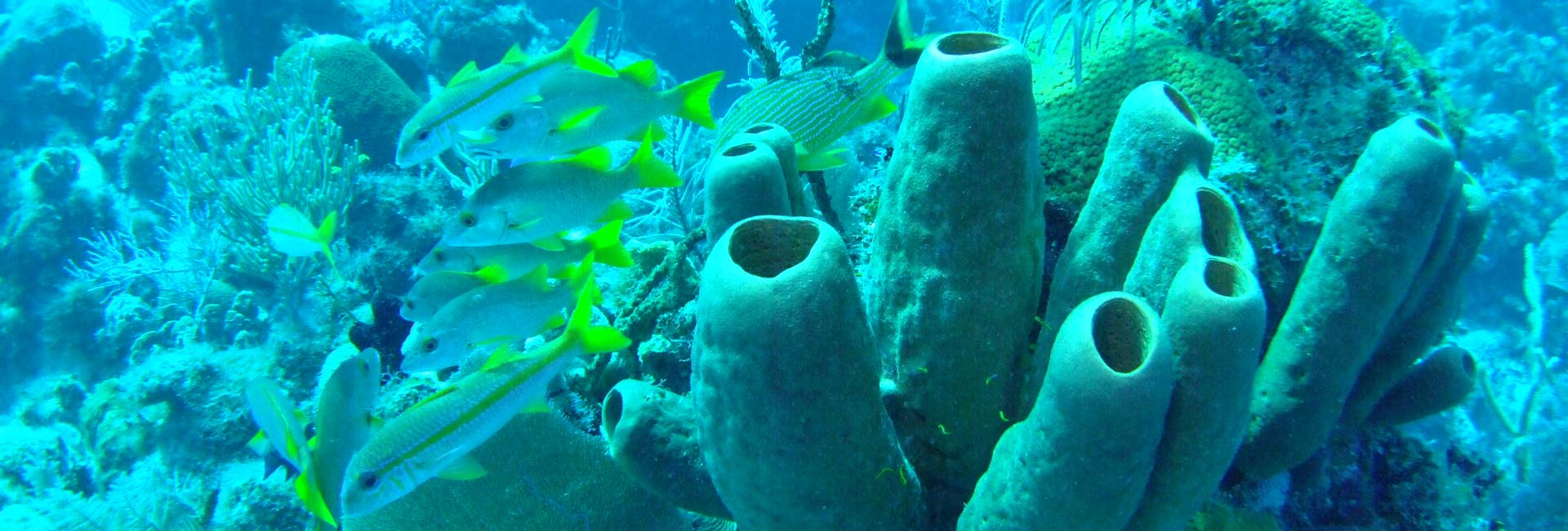

UM’s interdisciplinary Abess Center is collaborating with counterparts in the Caribbean Basin to help save one of the world’s natural wonders.
While Cuba’s art deco architecture and reputation of being “frozen in time” attracts many headlines, it’s what’s happening beneath the waters surrounding the communist island that is captivating marine scientists.
Researchers and students at the University of Miami’s Leonard and Jayne Abess Center for Ecosystem Science and Policy hope to collaborate with Cuban officials in one area—protecting the country’s pristine coral reefs.
Members of the interdisciplinary center—which aims to “educate the next generation of environmental scientists, policy makers, managers and planners”—have visited the Caribbean island to learn more about its environment and policies.
Shireen Rahimi, an Abess Center Ph.D. student, is one of a few UM students who attended the Mar Cuba 2015 conference, where she learned about environmental management priorities directly from Cuban scientists.
“It was really eye-opening to hear what Cuban scientists had to say about the state of their marine ecosystems and to learn about the different studies going on there,” Rahimi says.
About the Photo
Coral reefs are critical to marine ecosystems, but are fragile and can be harmed by rising temperatures associated with climate change.
Join the Conversation:
Follow on
Twitter:
UM Rosenstiel School of Marine and
Atmospheric Science, @UMiamiRSMAS
University of
Miami, @univmiami
UM News, @univmiaminews

One issue that stood out to her was the effect tourism has, and will continue to have on the Cuban environment, specifically coral reefs.
According to Cuban officials, a record 4 million tourists visited Cuba in 2016, up from 3.1 million a year earlier.
“Any work looking at tourism and how it manifests itself in Cuba and the Caribbean is really important given the history of tourism in the region,” Rahimi says. “The research is really exciting and I’m really happy to be a part of it.”
So exciting, in fact, that she decided to change her dissertation to cover “tourism in Cuba and how it will affect Cuba’s reefs.”
Rahimi, who is in her second year at the Abess Center and is collaborating with Cuban scientists and Rosenstiel School of Marine and Atmospheric Science alumnus Fernando Bretos, who now works for The Ocean Foundation and the Frost Science Museum, says that her original visit to Cuba has led her to return a second time, and plan a third trip in April 2017.

Kenny Broad, director of the Abess Center, says Cuba has some of the most well-kept coral reefs in the world. Broad, who was named one of “National Geographic’s Explorers of the Year” in 2011, says a combination of restrictions on boat and motor ownership along with longstanding Cuban environmental policies have helped keep their reefs healthy.
“Compared to other reefs, Cuba’s are in relatively good shape in large part as a byproduct of restrictions to access,” Broad says. Until recently, the majestic beaches and views in Cuba had only been open to a select few.
Now, with friendlier travel policies with the United States, the country will see more visitors.
While the increase in tourists—travel restrictions with the United States were eased in December 2014—can be viewed as positive, it also presents new environmental challenges. These same challenges are ones that some UM marine biologists feel can be solutions to ecosystem problems in the U.S.

Andrew Baker, a marine biologist with the Rosenstiel School, also attended the Mar Cuba 2015 conference and presented his work on coral reefs.
“I’ve always been kind of waiting for Cuba to be available for scientists to go in because it is so critical for understanding and managing the reefs in the region,” Baker says. “At the moment, scientists in Florida are doing a lot of coral restoration, where they grow corals from Florida in nurseries and plant them back out in reefs in the Caribbean.”
Baker, an associate professor in the Department of Marine Biology and Ecology, returned to Cuba in April 2017 to collect coral samples and examine the genetic parentage between the corals in Cuba, Mexico and the Florida Keys in hopes of finding matches to rebuild a more climate adaptable coral species.
This research, Baker says, was not possible in past years. Professors and students from the Abess Center and Rosenstiel hope that the warming of relations between the U.S. and Cuba will open new doors to environmental information that could be beneficial to both countries.
- ANDRES TAMAYO / UM News
